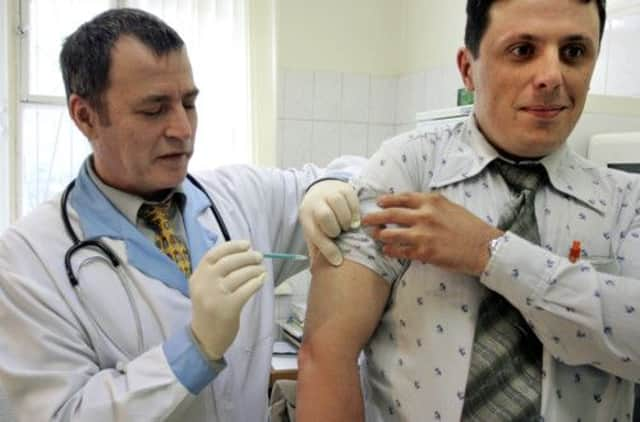Leaders: Vaccination a suitable case for treatment


These are vaccines which could prevent life-threatening illnesses, such as rotavirus in the young and shingles in the elderly. The serious outbreak of measles in parts of Britain where many parents were deterred from taking their children to get the MMR jab shows the dangers if vaccination programmes are not followed through.
The new programme is much bigger than the measles, mumps, and rubella one because it includes the elderly and extends winter flu vaccinations to young people. It seems entirely reasonable, therefore to conclude that it will add to the workload of family doctors. That does not mean, however, the demands of the BMA should immediately be met.
Advertisement
Hide AdAdvertisement
Hide AdCynics might note it involves extra payments to GPs, and that the warning coincides with peak public concern caused by the measles outbreaks. Scottish doctors have also recently been complaining about the size of their pay increase compared to that awarded to their counterparts elsewhere in the UK.
Doctors might respond that this is an unworthy joining up of matters which should be unconnected. Nonetheless they should be aware that while the public and their patients generally hold them in high esteem, people are also more cynical about public-sector payments because of the stringent economic circumstances which are depressing private pay levels and standards of living.
Ministers, who are responsible for ensuring public health programmes are carried out, have a responsibility to be judicious about acceding to such requests, but also have a duty to ensure that these programmes are actually implemented.
It seems fairly clear that delivery of this new programme should entail mobilisation of the resources of the whole NHS. Family doctors, in many larger group practices, do not carry out vaccinations, nurses do. Therefore health boards should consider whether there are nursing staff that could be made available or be trained so that there are the people available to do the work.
These other people are also under workload pressures, it has to be acknowledged. In that case, ministers and health boards will have to prioritise and perhaps some other work will be deemed less urgent. A case for that could be made because, as any parent will say, schools can become illness factories where one flu-infected child can pass it on to dozens of others. Reducing the chances of that happening would be a major public benefit.
Ultimately, this is a programme which must be carried out. Prevention is a lot better, and incidentally cheaper, than having to administer cures. And lack of money should not be an excuse or a hindrance.
Bank shares sale could be a lottery
Now that RBS has begun to look like what a bank should be and less like a car crash, the Treasury has begun to wonder how it can be put back on a private road.
One idea, which is understood to be being proposed by the Policy Exchange think-tank it is said to be looking at, is a “Tell Sid” style privatisation, following the advertising campaign of the 1980s which succeeded in persuading the public to buy shares in de-nationalised gas and electricity companies.
Advertisement
Hide AdAdvertisement
Hide AdNice idea the Treasury might think. However, Sid, we fear, would be deeply unimpressed. His first thought is likely to be that he has already paid for the government to hold all these bank shares through the extra taxes he has had to stump up since 2008 because the bank was run into a wall.
His second thought would probably be that he has learned to distrust banks deeply, so why would he pay (again) for their shares which he would unload as fast as possible, probably at a loss as everybody else did the same.
Sid’s opinion on this might be changed if the government announced that as a thank-you to taxpayers and as some recompense for all the fleecing they have had, it was going to award them free shares provided they got their tax returns in nice and early.
Sid might also get more excited if the government decided to sell the shares via a lottery in which winners could gamble, say, £10, in the hope of winning 100, or 1,000, or even 100,000 shares. The government might even raise more money to pay off debts that way.
There is a nice symmetry about that. Casino banking got everyone into this mess; a casino-style sell-off can clear it up.